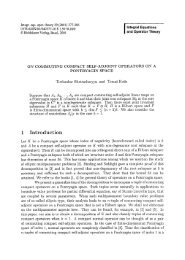home entertainment 2007
home entertainment 2007
home entertainment 2007
You also want an ePaper? Increase the reach of your titles
YUMPU automatically turns print PDFs into web optimized ePapers that Google loves.
Branford Marsalis understands<br />
why the nation has made<br />
rebuilding New Orleans a second<br />
or even third priority.<br />
“I kind of understand it on one<br />
hand. Not only the administration,<br />
but all the people in Congress who<br />
signed off on this war, this is the legacy<br />
that will define them, regardless of what<br />
happens in New Orleans. They realize<br />
that, ultimately, when the history books<br />
are written, there might be a book on<br />
how Congress and the administration let<br />
down the Gulf Coast—maybe one.<br />
There’ll be 25 books on Iraq and the ramifications<br />
of all the disastrous foreign-policy<br />
mistakes. Before [Bush] leaves, I think<br />
he has a vested interest in righting the<br />
ship, which is why all of a sudden there is<br />
detente with North Korea, talking to<br />
Iran, adult-type things that didn’t happen<br />
in the first six years. And New Orleans is<br />
just not a priority in the face of that,<br />
which is a disaster of his own making.”<br />
But this New Orleans native knows<br />
his <strong>home</strong>town well enough to know that<br />
it’s not just Bush and Congress that are to<br />
blame for the fact that the city continues<br />
to teeter on the edge of social and economic<br />
collapse.<br />
“It’s a pile of things, man, that makes<br />
New Orleans special. One of them is<br />
that when you go there, you are literally<br />
thrown back in time. People love that,<br />
but there’s also a mentality that goes<br />
with that. In order for things to be a<br />
throwback in time, people have to be in<br />
the stone age—they have to be—otherwise<br />
it’s not.<br />
“New Orleans doesn’t give a shit<br />
about itself. We call it ‘the city that care<br />
forgot.’ That’s what we call it. I mean we<br />
don’t care. The rampant amounts of corruption<br />
that occurred…New Orleans<br />
has corruption that is, in a lot of<br />
respects, with the exception of maybe<br />
the murder of politicians, right up there<br />
with Tammany Hall. And the United<br />
States and, ultimately, New Yorkers<br />
were tired of that shit, and they ran Boss<br />
Tweed out of town.<br />
“There were people, in NOLA, who<br />
thought corruption was endearing, and<br />
now they see the stepchild of all of that<br />
stuff, and now it’s not so funny. Now the<br />
catastrophe has kind of opened the curtain<br />
to all the unsavory stuff that goes on in the<br />
city. But that doesn’t mean that all of the<br />
people who have considerably benefited<br />
from the high levels of corruption are just<br />
AURAL ROBERT<br />
Robert Baird<br />
A Change is Gonna Come?<br />
going to lie down.”<br />
Marsalis is doing<br />
his part to rebuild<br />
NOLA, first as a<br />
spokesman and fundraiser<br />
(along with<br />
Harry Connick, Jr.)<br />
for <strong>home</strong>builders,<br />
Habitat for Humanity,<br />
and the Musicians<br />
Village Project,<br />
which is building<br />
housing for musicians<br />
made <strong>home</strong>less<br />
by Hurricane Katrina.<br />
His label, Marsalis<br />
Music, has just released new records by<br />
two veteran New Orleans players who’ve<br />
remained in the city, clarinetist Alvin<br />
Batiste and drummer Bob French.<br />
The first record, Marsalis Music Honors<br />
Alvin Batiste, Batiste’s first record in a<br />
decade, is solidly modern jazz—a postbop<br />
album from one of the few NOLA<br />
musicians to have ever made a living<br />
playing something other than Preservation<br />
Hall-styled New Orleans trad music,<br />
its low-brow, mostly white offspring,<br />
Dixieland, or, worst of all, the pop/jazz<br />
garbage you hear today booming out of<br />
the bars on Bourbon Street. A composer<br />
as well as player, Batiste jammed with<br />
Ornette Coleman in L.A. in the 1950s,<br />
and played gigs with Guitar Slim back in<br />
New Orleans. The band on MMH Alvin<br />
Batiste is a mix of younger, lesser-known<br />
Louisiana players, such as pianist<br />
Lawrence Field, bassist Ricardo<br />
Rodriguez, and two former students of<br />
Batiste, who’s taught music at Southern<br />
University since 1969: drummer Herlin<br />
Riley, and Marsalis himself on soprano<br />
saxophone.<br />
“Bat chased me out of Louisiana and<br />
sent me to Boston because he realized<br />
very early on that I didn’t need much<br />
encouragement to become not serious,”<br />
Marsalis says in a tired croak. He’s in<br />
Amsterdam, nearing the end of a string<br />
of European one-nighters. “At a school<br />
like Southern University, if you can<br />
play Grover Washington’s solo on ‘Mr.<br />
Magic,’ you’re like a star. That was<br />
never very difficult for me to do that.<br />
So I eschewed the more difficult tasks<br />
assigned to me because the honeys<br />
liked Grover.<br />
“Bat said, ‘Man, you gotta go.’ He<br />
called my father [Ellis Marsalis] and said,<br />
‘If I see him here next year, I’m flunking<br />
him.’ Staying<br />
there would<br />
have been a<br />
dead end for<br />
me. He was<br />
right.”<br />
Also selftitled,<br />
Marsalis<br />
Music Honors Bob<br />
French is an<br />
easygoing runthrough<br />
of<br />
New Orleans<br />
trad music, and<br />
includes such<br />
stone Crescent<br />
City classics as “Basin Street Blues,”<br />
“Way Down Yonder in New Orleans,”<br />
“When It’s Sleepy Time Down South,”<br />
and “Do You Know What It Means to<br />
Miss New Orleans.” The track list’s Pops<br />
slant is deliberate: French’s great-uncle<br />
Maurice played trombone in Armstrong’s<br />
band. French’s own band is<br />
another mix of younger NOLA players—<br />
trumpeter Leon “Kid Chocolate” Brown<br />
and Troy “Trombone Shorty” Andrews—<br />
and veterans like Branford and fellow<br />
New Orleanian Connick, Jr.<br />
French began his career in a high<br />
school band that included piano great<br />
James Booker, Art and Charles Neville<br />
of the Neville Brothers, and Alvin<br />
Batiste. Ellis Marsalis played traditional<br />
music in French’s band for years when<br />
Branford and his brother Wynton were<br />
kids. One night, the Marsalis brothers<br />
were invited onstage.<br />
“Yeah, but I sucked; I was just playing<br />
to play. When you’re eight or nine years<br />
old, you get a free pass. And then, by the<br />
time you’re 15, all the New Orleans<br />
guys are like, ‘Don’t come on this stage<br />
bullshittin’.”<br />
Both albums feature a careful<br />
approach to sound that Branford, who by<br />
now is anxious to wrap up and crawl into<br />
bed for a pre-show nap, rallies to explain.<br />
“One thing that we do that separates<br />
us from other jazz labels is that we focus<br />
our money on making the records completely<br />
representative of how musicians<br />
actually sound at a given point in time. If<br />
you listen to a lot of acoustic records,<br />
they tend to be very thin, they use a lot of<br />
compression, and the musicians record in<br />
very small rooms—which works in electric<br />
music, but it’s death in acoustic<br />
music. We spare no expense to make the<br />
sound quality great.” ■■<br />
138 www.Stereophile.com, May <strong>2007</strong>

















